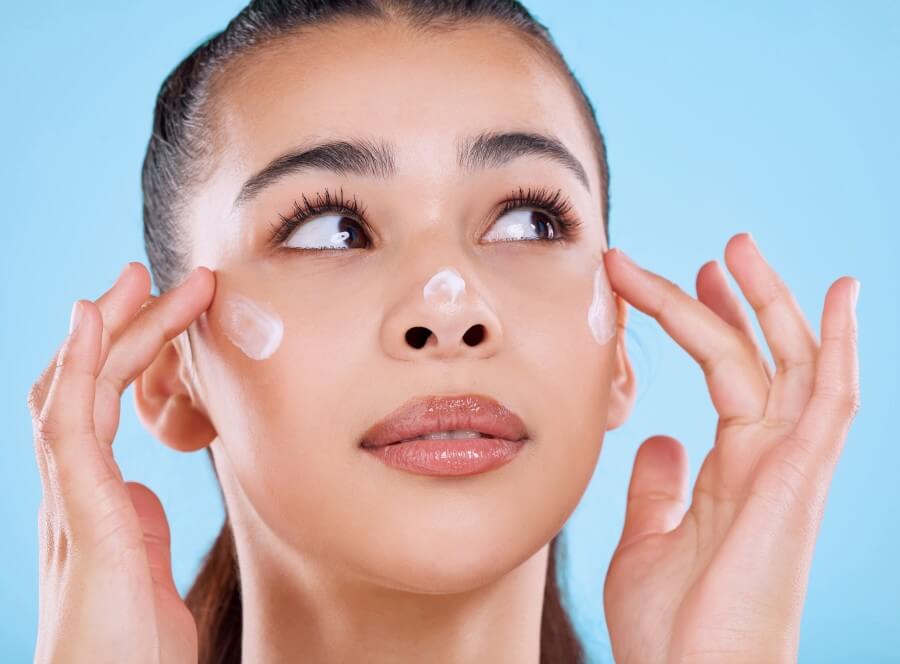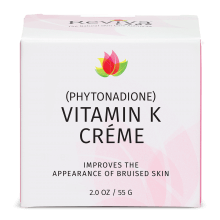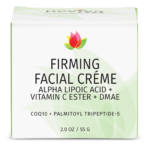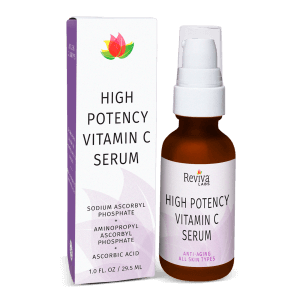Natural, Reviva Labs, Skin Care
Vitamin K2 and Skin Aging
Skin aging is an unavoidable aspect of life, marked by visible signs such as wrinkles, fine lines, and a decrease in skin elasticity and firmness. While numerous factors contribute to skin aging, including genetic predisposition, environmental influences, and lifestyle choices, recent studies have shed light on the pivotal role vitamins play in skin health. Among these, Vitamin K stands out for its unique benefits and potential in slowing down the signs of aging skin.
Understanding Vitamin K and Its Forms
Vitamin K, a fat-soluble vitamin, is crucial for various bodily functions, including blood clotting and bone metabolism. It exists in two primary forms: Vitamin K1 (phylloquinone or phytonadione), found predominantly in green leafy vegetables, and Vitamin K2 (menaquinone), present in fermented foods and animal products. While both forms are essential for health, their roles in skin health, particularly in the context of aging, have become a focal point of recent dermatological research.
Skin Aging: A Closer Look at the Causes
The skin, our body’s largest organ, is our first defense against environmental stressors. Over time, factors such as UV exposure, pollution, and lifestyle habits can lead to oxidative stress and damage, accelerating the skin aging process. Internally, the natural decline of collagen and elastin production with age results in loss of skin elasticity and firmness. Understanding these mechanisms is crucial in addressing skin aging effectively.
Vitamin K: A Hidden Ally Against Skin Aging
Emerging research highlights Vitamin K’s potential in supporting skin health and mitigating aging signs. Its role extends beyond blood clotting, touching on aspects crucial for maintaining youthful skin. For instance, Vitamin K is involved in the synthesis of proteins that regulate skin elasticity, suggesting that adequate Vitamin K levels could help preserve the skin’s structural integrity and resilience.
Scientific Insights on Vitamin K and Skin Elasticity
One pivotal study has shown a significant correlation between Vitamin K levels and skin elasticity. Researchers found that higher dietary intake of Vitamin K was associated with reduced visible signs of skin aging in certain populations. This study underscores the potential of Vitamin K as a key nutrient in skincare regimens focused on aging gracefully.
A randomized, controlled trial suggests that topical application of Vitamin K significantly reduces healing time in patients.
Incorporating Vitamin K into Your Skincare Routine
Leveraging the benefits of Vitamin K for skin health involves a multifaceted approach. Dietary adjustments to include Vitamin K-rich foods such as kale, spinach, and fermented products can enhance your overall nutrient profile. For those seeking targeted skin benefits, selecting skincare products formulated with Vitamin K can provide direct support to areas most affected by aging.
The Synergy of Vitamin K with Other Nutrients
Maximizing the skin benefits of Vitamin K involves more than just focusing on this single vitamin. A holistic approach, combining Vitamin K with other antioxidants and nutrients such as Vitamin A, Vitamin C, and Vitamin E, can offer enhanced protection against oxidative stress and support skin repair and rejuvenation processes. This synergistic approach underscores the importance of a balanced diet and comprehensive skincare routine.
Navigating the World of Vitamin K Skincare Products
As interest in Vitamin K’s skin benefits grows, the market sees an influx of skincare products boasting Vitamin K as a key ingredient. When selecting these products, it’s vital to look beyond marketing claims and focus on formulations that offer a concentration of Vitamin K effective enough to penetrate the skin and deliver tangible benefits.
A Practical Guide to Enhancing Skin Health with Vitamin K
For individuals looking to incorporate Vitamin K into their skincare routine, starting with dietary changes is a practical first step. Incorporating topical treatments with Vitamin K can further enhance skin health, particularly for areas prone to aging signs. Consulting with a dermatologist can provide personalized advice and ensure that any new skincare addition complements your existing routine and skin type.
Future Directions: Vitamin K and Skin Health Research
The exploration of Vitamin K’s role in skin health is an ongoing journey. With each new study, we gain insights into how this vital nutrient can support skin elasticity, resilience, and overall appearance. Continued research is essential for unlocking the full potential of Vitamin K in skincare, promising exciting developments for those seeking natural ways to combat skin aging.
The Vital Role of Vitamin K in Combatting Skin Aging
The quest for youthful, healthy skin is a common goal shared by many. In the vast landscape of skincare and nutrition, Vitamin K emerges as a promising ally against skin aging. By understanding its role, incorporating it into your diet and skincare routine, and staying informed about the latest research, you can harness the power of Vitamin K to support your skin’s health and vitality for years to come.










